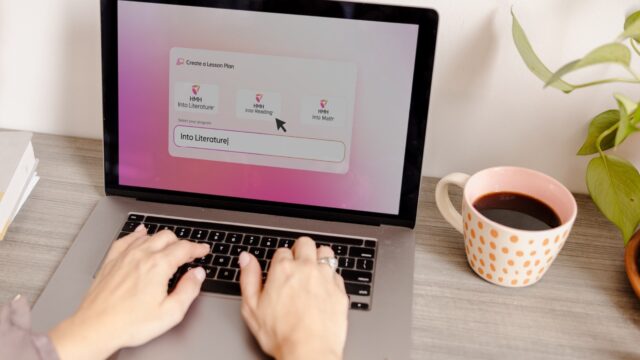
As states react to the most recent NAEP scores, High Quality Instructional Materials (HQIM) continue to be a key lever to improve student learning. However, instructional materials by themselves are not enough to improve student outcomes. Clear communication from school and district leadership, high-quality implementation supports such as professional learning, and assessment data are all essential to help teachers get their students on track to reach grade-level proficiency.
Districts who want to improve student literacy outcomes should consider deploying the following HQIM implementation strategies to drive student success.
1. Provide robust, integrated, ongoing professional learning for educators
Quality professional learning integrates curriculum and assessment data into actionable instructional practices. Training teachers on how to connect curriculum to assessment data to instructional practices provides them with the necessary tools to make decisions about student learning. Educators need actionable and practical solutions that support integrating data with curriculum-based insights. According to the 2024 Educator Confidence Report, 66% of educators surveyed feel that tools that connect instruction with supplemental practice, intervention, and assessment increase effectiveness and build instructional confidence.
States can offer both solutions to professional learning that equip educators with a comprehensive approach to professional learning that ensures educators are not left to piece together disparate information, providing a more streamlined and effective teaching process.
2. Provide educators with customized professional learning designed to meet their unique needs
Supporting educators with effective and intentional professional development opportunities is paramount to building educator confidence and ensuring effective instruction. Variables such as experience level, student population served, and content, pedagogical and technological knowledge should be considered when developing professional learning plans for educators.
States can offer multiple modalities for educator support, including personalized coaching and opportunities for group learning to support collective learning and efficacy. Tailor professional learning to meet each teacher's needs, including support for multilingual learners, students with disabilities, etc. Flexible formats such as 1:1 virtual coaching make coaching accessible to more teachers and enhance curriculum implementation fidelity.
States that offer both personalized virtual coaching to support teachers individually, and large group collaborative opportunities find success by allowing educators to capitalize on the collective wisdom of educator support.
“We learn from other teachers because they know what we're going through. They know what we do day in and day out, so we can share a lot of those great ideas with each other. Anytime I refer back to Teacher’s Corner to point me in the right direction, I feel like [the community] has been through what I’ve been through. A lot of times it has been through the eyes of a teacher in the classroom who is using the same materials. So, it has been very helpful.” Nick Wheeler, 6th Grade ELA Teacher, Bristow Elementary.
3. Offer professional learning for school and district leadership
Leadership support is imperative for successful curriculum implementation. Research featured in the Educational Research Journal highlights principal beliefs that curriculum leaders are required to be knowledgeable in curriculum and in implementation strategies. Providing leaders with resources for professional learning services is essential in equipping leaders with the skills tools they need to support their instructional staff. Leaders with knowledge of the curriculum and instructional support can provide guidance and direct additional resources for staff as needed.
High-quality instructional materials require equally high-quality implementation support with professional learning for educators and leaders. Integrated, customized professional learning for both teachers and leaders can help districts achieve successful HQIM implementation. Providing comprehensive professional learning that supports educators and leaders in delivering high-quality education will allow states to take student growth to the next level.
***
Learn more about how our approach to instructional coaching can support teachers in meeting their professional goals with HMH Coachly.
Download Building Your School Culture: An Administrator's Guide today.












